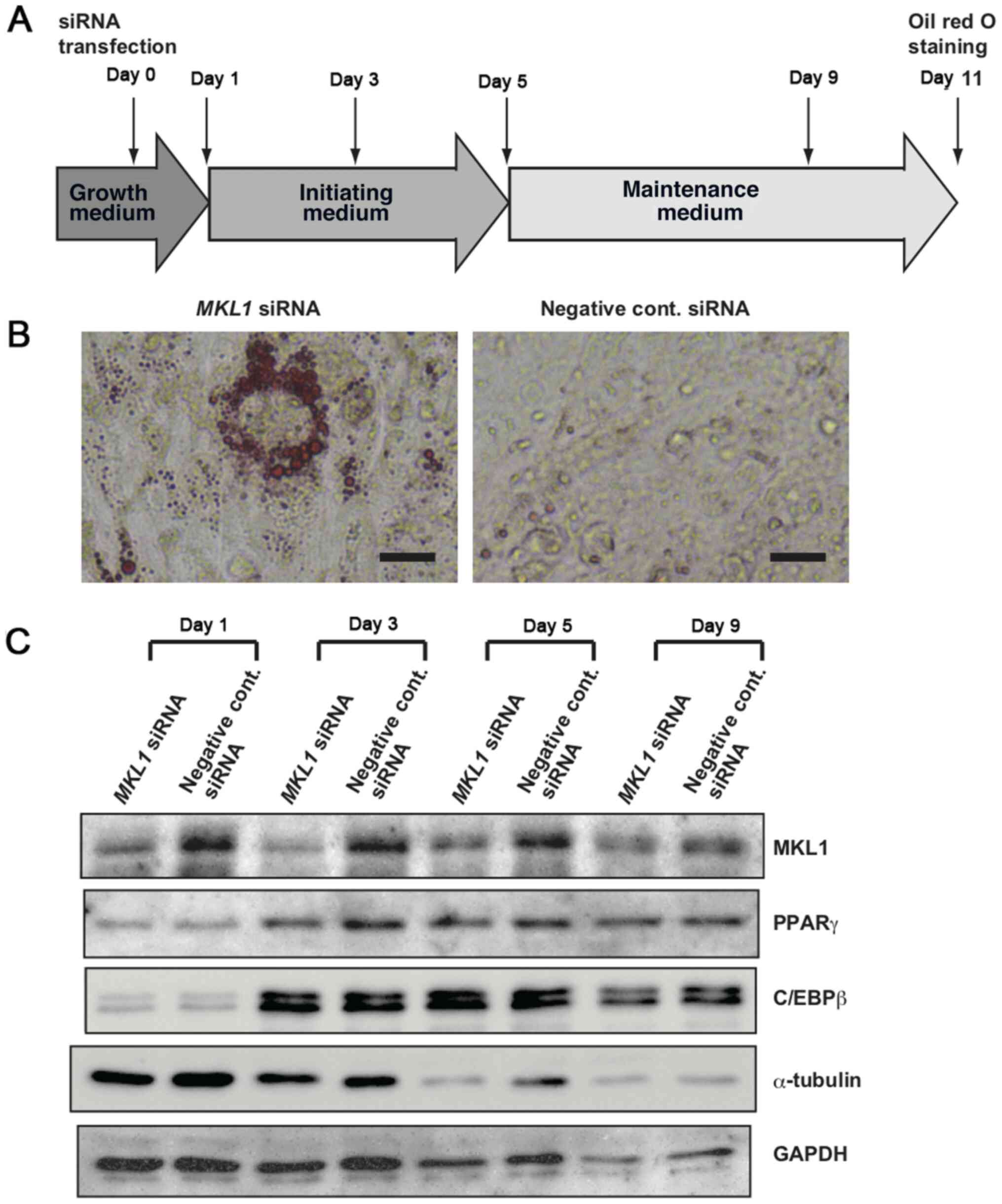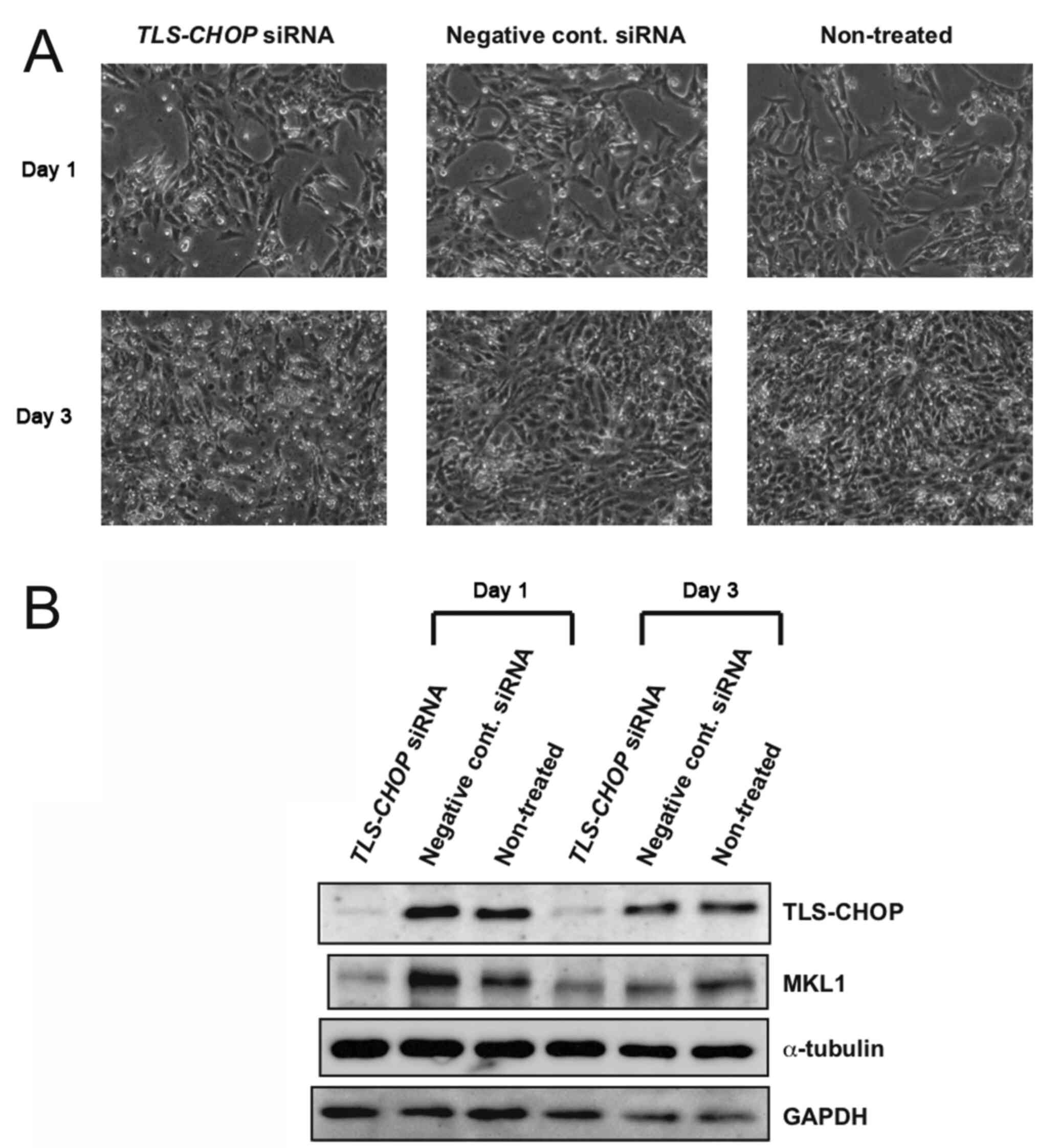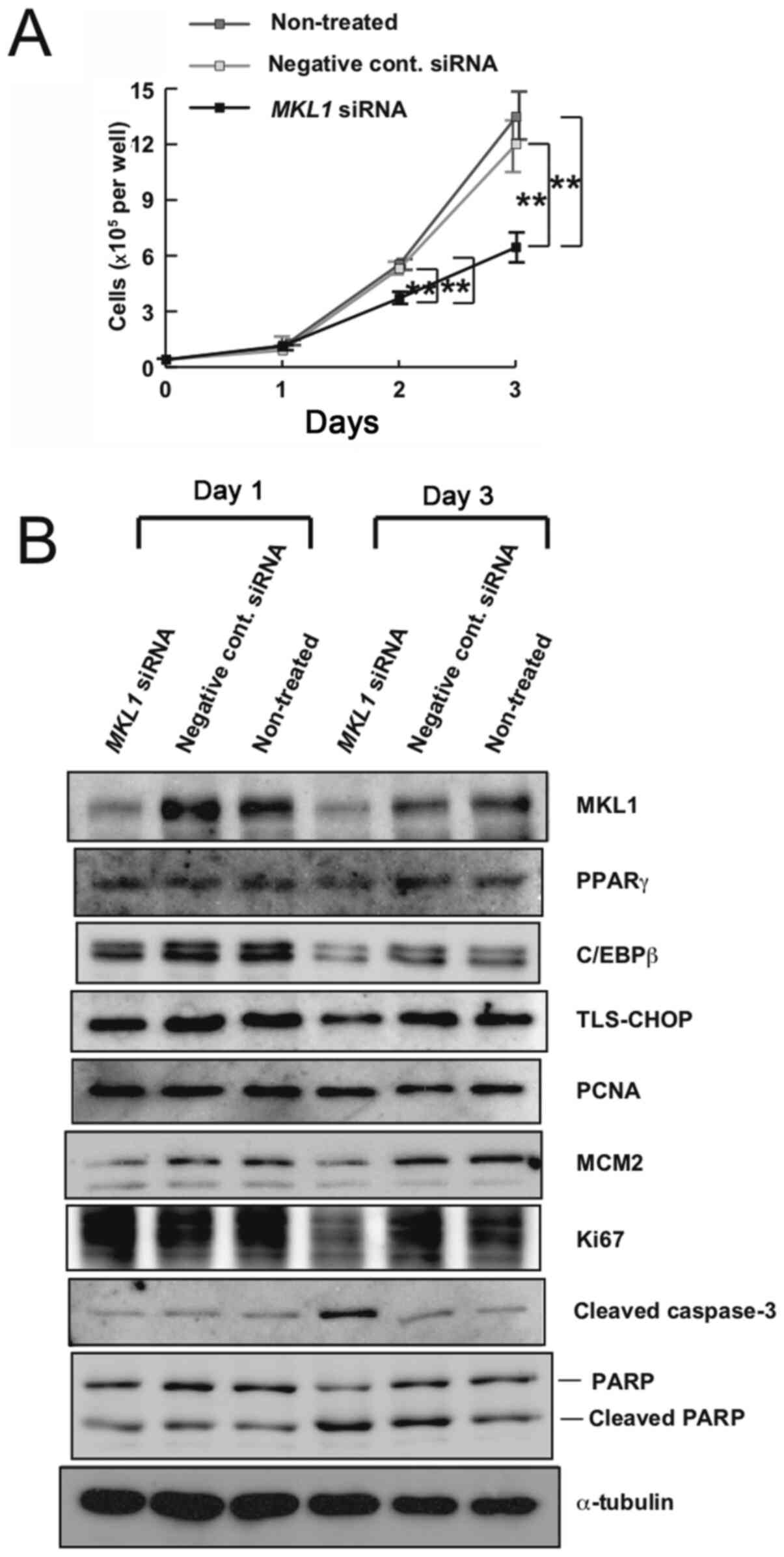|
1
|
He BC, Chen L, Zuo GW, Zhang W, Bi Y,
Huang J, Wang Y, Jiang W, Luo Q, Shi Q, et al: Synergistic
antitumor effect of the activated PPARgamma and retinoid receptors
on human osteosarcoma. Clin Cancer Res. 16:2235–2245. 2010.
View Article : Google Scholar : PubMed/NCBI
|
|
2
|
Aubin JE: Regulation of osteoblast
formation and function. Rev Endocr Metab Disord. 2:81–94. 2001.
View Article : Google Scholar : PubMed/NCBI
|
|
3
|
Luu HH, Song WX, Luo X, Manning D, Luo J,
Deng ZL, Sharff KA, Montag AG, Haydon RC and He TC: Distinct roles
of bone morphogenetic proteins in osteogenic differentiation of
mesenchymal stem cells. J Orthop Res. 25:665–677. 2007. View Article : Google Scholar : PubMed/NCBI
|
|
4
|
Deng ZL, Sharff KA, Tang N, Song WX, Luo
J, Luo X, Chen J, Bennett E, Reid R, Manning D, et al: Regulation
of osteogenic differentiation during skeletal development. Front
Biosci. 13:2001–2021. 2008. View
Article : Google Scholar : PubMed/NCBI
|
|
5
|
Reya T, Morrison SJ, Clarke MF and
Weissman IL: Stem cells, cancer, and cancer stem cells. Nature.
414:105–111. 2001. View
Article : Google Scholar : PubMed/NCBI
|
|
6
|
Luther G, Rames R, Wagner ER, Zhu G, Luo
Q, Bi Y, Kim SH, Gao JL, Huang E, Yang K, et al: Molecular basis of
differentiation therapy for soft tissue sarcomas. Trends Cancer
Res. 6:69–90. 2010.PubMed/NCBI
|
|
7
|
Fritchie KJ, Goldblum JR, Tubbs RR, Sun Y,
Carver P, Billings SD and Rubin BP: The expanded histologic
spectrum of myxoid liposarcoma with an emphasis on newly described
patterns: Implications for diagnosis on small biopsy specimens. Am
J Clin Pathol. 137:229–239. 2012. View Article : Google Scholar : PubMed/NCBI
|
|
8
|
Dal Cin P, Sciot R, Panagopoulos I, Aman
P, Samson I, Mandahl N, Mitelman F, Van den Berghe H and Fletcher
CD: Additional evidence of a variant translocation t(12;22) with
EWS-CHOP fusion in myxoid liposarcoma: Clinicopathologic features.
J Pathol. 182:437–441. 1997. View Article : Google Scholar : PubMed/NCBI
|
|
9
|
Loubignac F, Bourtoul C and Chapel F:
Myxoid liposarcoma: A rare soft tissue tumor with a misleading
benign appearance. World J Surg Oncol. 7:422009. View Article : Google Scholar : PubMed/NCBI
|
|
10
|
Forni C, Minuzzo M, Virdis E, Tamborini E,
Simone M, Tavecchio M, Erba E, Grosso F, Gronchi A, Aman P, et al:
Trabectedin (ET-743) promotes differentiation in myxoid liposarcoma
tumors. Mol Cancer Ther. 8:449–457. 2009. View Article : Google Scholar : PubMed/NCBI
|
|
11
|
Charytonowicz E, Terry M, Coakley K, Telis
L, Remotti F, Cordon-Cardo C, Taub RN and Matushansky I: PPARγ
agonists enhance ET-743-induced adipogenic differentiation in a
transgenic mouse model of myxoid round cell liposarcoma. J Clin
Invest. 122:886–898. 2012. View
Article : Google Scholar : PubMed/NCBI
|
|
12
|
Oikawa K, Mizusaki A, Takanashi M, Ozaki
T, Sato F, Kuroda M and Muragaki Y: PRG4 expression in myxoid
liposarcoma maintains tumor cell growth through suppression of an
antitumor cytokine IL-24. Biochem Biophys Res Commun. 485:209–214.
2017. View Article : Google Scholar : PubMed/NCBI
|
|
13
|
Gomez EW, Chen QK, Gjorevski N and Nelson
CM: Tissue geometry patterns epithelial-mesenchymal transition via
intercellular mechanotransduction. J Cell Biochem. 110:44–51.
2010.PubMed/NCBI
|
|
14
|
Connelly JT, Gautrot JE, Trappmann B, Tan
DW, Donati G, Huck WT and Watt FM: Actin and serum response factor
transduce physical cues from the microenvironment to regulate
epidermal stem cell fate decisions. Nat Cell Biol. 12:711–718.
2010. View
Article : Google Scholar : PubMed/NCBI
|
|
15
|
Selvaraj A and Prywes R: Megakaryoblastic
leukemia-1/2, a transcriptional co-activator of serum response
factor, is required for skeletal myogenic differentiation. J Biol
Chem. 278:41977–41987. 2003. View Article : Google Scholar : PubMed/NCBI
|
|
16
|
Esnault C, Stewart A, Gualdrini F, East P,
Horswell S, Matthews N and Treisman R: Rho-actin signaling to the
MRTF coactivators dominates the immediate transcriptional response
to serum in fibroblasts. Genes Dev. 28:943–958. 2014. View Article : Google Scholar : PubMed/NCBI
|
|
17
|
Kalita K, Kharebava G, Zheng JJ and Hetman
M: Role of megakaryoblastic acute leukemia-1 in ERK1/2-dependent
stimulation of serum response factor-driven transcription by BDNF
or increased synaptic activity. J Neurosci. 26:10020–10032. 2006.
View Article : Google Scholar : PubMed/NCBI
|
|
18
|
Kalita K, Kuzniewska B and Kaczmarek L:
MKLs: Co-factors of serum response factor (SRF) in neuronal
responses. Int J Biochem Cell Biol. 44:1444–1447. 2012. View Article : Google Scholar : PubMed/NCBI
|
|
19
|
Nobusue H, Onishi N, Shimizu T, Sugihara
E, Oki Y, Sumikawa Y, Chiyoda T, Akashi K, Saya H and Kano K:
Regulation of MKL1 via actin cytoskeleton dynamics drives adipocyte
differentiation. Nat commun. 5:33682014. View Article : Google Scholar : PubMed/NCBI
|
|
20
|
Rosenwald M, Efthymiou V, Opitz L and
Wolfrum C: SRF and MKL1 independently inhibit brown adipogenesis.
PLoS One. 12:e01706432017. View Article : Google Scholar : PubMed/NCBI
|
|
21
|
Ma Z, Morris SW, Valentine V, Li M,
Herbrick JA, Cui X, Bouman D, Li Y, Mehta PK, Nizetic D, et al:
Fusion of two novel genes, RBM15 and MKL1, in the t(1;22)(p13;q13)
of acute megakaryoblastic leukemia. Nat Genet. 28:220–221. 2001.
View Article : Google Scholar : PubMed/NCBI
|
|
22
|
Mercher T, Coniat MB, Monni R, Mauchauffe
M, Nguyen Khac F, Gressin L, Mugneret F, Leblanc T, Dastugue N,
Berger R and Bernard OA: Involvement of a human gene related to the
drosophila spen gene in the recurrent t(1;22) translocation of
acute megakaryocytic leukemia. Proc Natl Acad Sci USA.
98:5776–5779. 2001. View Article : Google Scholar : PubMed/NCBI
|
|
23
|
Oikawa K, Ohbayashi T, Kiyono T, Nishi H,
Isaka K, Umezawa A, Kuroda M and Mukai K: Expression of a novel
human gene, human wings apart-like (hWAPL), is associated with
cervical carcinogenesis and tumor progression. Cancer Res.
64:3545–3549. 2004. View Article : Google Scholar : PubMed/NCBI
|
|
24
|
Oikawa K, Tanaka M, Itoh S, Takanashi M,
Ozaki T, Muragaki Y and Kuroda M: A novel oncogenic pathway by
TLS-CHOP involving repression of MDA-7/IL-24 expression. Br J
Cancer. 106:1976–1979. 2012. View Article : Google Scholar : PubMed/NCBI
|
|
25
|
Varney SD, Betts CB, Zheng R, Wu L, Hinz
B, Zhou J and Van De Water L: Hic-5 is required for myofibroblast
differentiation by regulating mechanically dependent MRTF-A nuclear
accumulation. J Cell Sci. 129:774–787. 2016. View Article : Google Scholar : PubMed/NCBI
|
|
26
|
Oikawa K, Ohbayashi T, Mimura J,
Fujii-Kuriyama Y, Teshima S, Rokutan K, Mukai K and Kuroda M:
Dioxin stimulates synthesis and secretion of IgE-dependent
histamine-releasing factor. Biochem Biophys Res Commun.
290:984–987. 2002. View Article : Google Scholar : PubMed/NCBI
|
|
27
|
Oikawa K, Ishida T, Imamura T, Yoshida K,
Takanashi M, Hattori H, Ishikawa A, Fujita K, Yamamoto K,
Matsubayashi J, et al: Generation of the novel monoclonal antibody
against TLS/EWS-CHOP chimeric oncoproteins that is applicable to
one of the most sensitive assays for myxoid and round cell
liposarcomas. Am J Surg Pathol. 30:351–356. 2006. View Article : Google Scholar : PubMed/NCBI
|
|
28
|
Tontonoz P, Hu E, Graves RA, Budavari AI
and Spiegelman BM: mPPAR gamma 2: tissue-specific regulator of an
adipocyte enhancer. Genes Dev. 8:1224–1234. 1994. View Article : Google Scholar : PubMed/NCBI
|
|
29
|
Chawla A, Schwarz EJ, Dimaculangan DD and
Lazar MA: Peroxisome proliferator-activated receptor (PPAR) gamma:
Adipose-predominant expression and induction early in adipocyte
differentiation. Endocrinology. 135:798–800. 1994. View Article : Google Scholar : PubMed/NCBI
|
|
30
|
Guo L, Li X and Tang QQ: Transcriptional
regulation of adipocyte differentiation: A central role for
CCAAT/enhancer-binding protein (C/EBP) β. J Biol Chem. 290:755–761.
2015. View Article : Google Scholar : PubMed/NCBI
|
|
31
|
Batchvarova N, Wang XZ and Ron D:
Inhibition of adipogenesis by the stressinduced protein CHOP
(Gadd153). EMBO J. 14:4654–4661. 1995. View Article : Google Scholar : PubMed/NCBI
|
|
32
|
Kuroda M, Ishida T, Takanashi M, Satoh M,
Machinami R and Watanabe T: Oncogenic transformation and inhibition
of adipocytic conversion of preadipocytes by TLS/FUS-CHOP type II
chimeric protein. Am J Pathol. 151:735–744. 1997.PubMed/NCBI
|
|
33
|
Rosen ED and Spiegelman BM: Molecular
regulation of adipogenesis. Annu Rev Cell Dev Biol. 16:145–171.
2000. View Article : Google Scholar : PubMed/NCBI
|
|
34
|
Gregoire FM, Smas CM and Sul HS:
Understanding adipocyte differentiation. Physiol Rev. 78:783–809.
1998. View Article : Google Scholar : PubMed/NCBI
|
|
35
|
Juríková M, Danihel Ľ, Polák Š and Varga
I: Ki67, PCNA, and MCM proteins: Markers of proliferation in the
diagnosis of breast cancer. Acta Histochem. 118:544–552. 2016.
View Article : Google Scholar : PubMed/NCBI
|
|
36
|
Malhotra U, Zaidi AH, Kosovec JE, Kasi PM,
Komatsu Y, Rotoloni CL, Davison JM, Irvin CR, Hoppo T, Nason KS, et
al: Prognostic value and targeted inhibition of survivin expression
in esophageal adenocarcinoma and cancer-adjacent squamous
epithelium. PLoS One. 8:e783432013. View Article : Google Scholar : PubMed/NCBI
|
|
37
|
Oyadomari S and Mori M: Roles of
CHOP/GADD153 in endoplasmic reticulum stress. Cell Death Differ.
11:381–389. 2004. View Article : Google Scholar : PubMed/NCBI
|
|
38
|
Spiegelman BM and Farmer SR: Decreases in
tubulin and actin gene expression prior to morphological
differentiation of 3T3 adipocytes. Cell. 29:53–60. 1982. View Article : Google Scholar : PubMed/NCBI
|
|
39
|
Arsenijevic T, Gre´goire F, Delforge V,
Delporte C and Perret J: Murine 3T3-L1 adipocyte cell
differentiation model: Validated reference genes for qPCR gene
expression analysis. PLoS One. 7:e375172012. View Article : Google Scholar : PubMed/NCBI
|
|
40
|
Zhang J, Tang H, Zhang Y, Deng R, Shao L,
Liu Y, Li F, Wang X and Zhou L: Identification of suitable
reference genes for quantitative RT-PCR during 3T3-L1 adipocyte
differentiation. Int J Mol Med. 33:1209–1218. 2014. View Article : Google Scholar : PubMed/NCBI
|
|
41
|
Gentile AM, Lhamyani S, Coín-Aragüez L,
Oliva-Olivera W, Zayed H, Vega-Rioja A, Monteseirin J, Romero-Zerbo
SY, Tinahones FJ, Bermúdez-Silva FJ and Bekay RE: RPL13A and EEF1A1
are suitable reference genes for qPCR during adipocyte
differentiation of vascular stromal cells from patients with
different BMI and HOMA-IR. PLoS One. 11:e01570022016. View Article : Google Scholar : PubMed/NCBI
|
|
42
|
Kuroda M, Wang X, Sok J, Yin Y, Chung P,
Giannotti JW, Jacobs KA, Fitz LJ, Murtha-Riel P, Turner KJ and Ron
D: Induction of a secreted protein by the myxoid liposarcoma
oncogene. Proc Natl Acad Sci USA. 96:5025–5030. 1999. View Article : Google Scholar : PubMed/NCBI
|
|
43
|
Perez-Mancera PA, Bermejo-Rodrıguez C,
Sanchez-Martin M, Abollo-Jimenez F, Pintado B and Sanchez-Garcıa I:
FUS-DDIT3 prevents the development of adipocytic precursors in
liposarcoma by repressing PPARgamma and C/EBPalpha and activating
eIF4E. PLoS One. 3:e25692008. View Article : Google Scholar : PubMed/NCBI
|
|
44
|
Andersson MK, Goransson M, Olofsson A,
Andersson C and Aman P: Nuclear expression of FLT1 and its ligand
PGF in FUS-DDIT3 carrying myxoid liposarcomas suggests the
existence of an intracrine signaling loop. BMC Cancer. 10:2492010.
View Article : Google Scholar : PubMed/NCBI
|

















